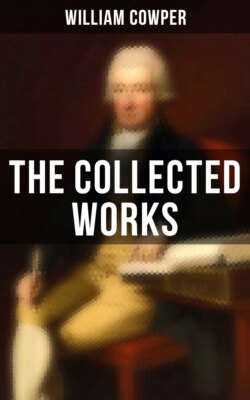Читать книгу The Collected Works - William Cowper - Страница 156
На сайте Литреса книга снята с продажи.
TO THE REV. WILLIAM UNWIN.
ОглавлениеTable of Contents
Olney, Nov. 5, 1781.
My dear William—I give you joy of your safe return from the lips of the great deep. You did not discern many signs of sobriety or true wisdom among the people of Brighthelmstone, but it is not possible to observe the manners of a multitude, of whatever rank, without learning something: I mean, if a man has a mind like yours, capable of reflection. If he sees nothing to imitate, he is sure to see something to avoid; if nothing to congratulate his fellow creatures upon, at least much to excite his compassion. There is not, I think, so melancholy a sight in the world (an hospital is not to be compared with it) as that of a thousand persons distinguished by the name of gentry, who, gentle perhaps by nature, and made more gentle by education, have the appearance of being innocent and inoffensive, yet being destitute of all religion, or not at all governed by the religion they profess, are none of them at any great distance from an eternal state, where self-deception will be impossible, and where amusements cannot enter. Some of them, we may say, will be reclaimed—it is most probable indeed that some of them will, because mercy, if one may be allowed the expression, is fond of distinguishing itself by seeking its objects among the most desperate class; but the Scripture gives no encouragement to the warmest charity to hope for deliverance for them all. When I see an afflicted and unhappy man, I say to myself, There is perhaps a man whom the world would envy, if they knew the value of his sorrows, which are possibly intended only to soften his heart, and to turn his affections towards their proper centre. But, when I see or hear of a crowd of voluptuaries, who have no ears but for music, no eyes but for splendour, and no tongue but for impertinence and folly—I say, or at least I see occasion to say—This is madness—this persisted in must have a tragical conclusion. It will condemn you, not only as Christians unworthy of the name, but as intelligent creatures. You know by the light of nature, if you have not quenched it, that there is a God, and that a life like yours cannot be according to his will.
I ask no pardon of you for the gravity and gloominess of these reflections, which I stumbled on when I least expected it; though, to say the truth, these or others of a like complexion, are sure to occur to me when I think of a scene of public diversion like that you have lately left.
I am inclined to hope that Johnson told you the truth, when he said he should publish me soon after Christmas. His press has been rather more punctual in its remittances than it used to be; we have now but little more than two of the longest pieces, and the small ones that are to follow, by way of epilogue, to print off, and then the affair is finished. But once more I am obliged to gape for franks; only these, which I hope will be the last I shall want, at yours and Mr. ——'s convenient leisure.
We rejoice that you have so much reason to be satisfied with John's proficiency. The more spirit he has the better, if his spirit is but manageable, and put under such management as your prudence and Mrs. Unwin's will suggest. I need not guard you against severity, of which I conclude there is no need, and which I am sure you are not at all inclined to practise without it; but perhaps if I was to whisper, beware of too much indulgence, I should only give a hint that the fondness of a father for a fine boy might seem to justify. I have no particular reason for the caution, at this distance it is not possible I should, but, in a case like yours, an admonition of that sort seldom wants propriety.
Yours, my dear friend,
W. C.
